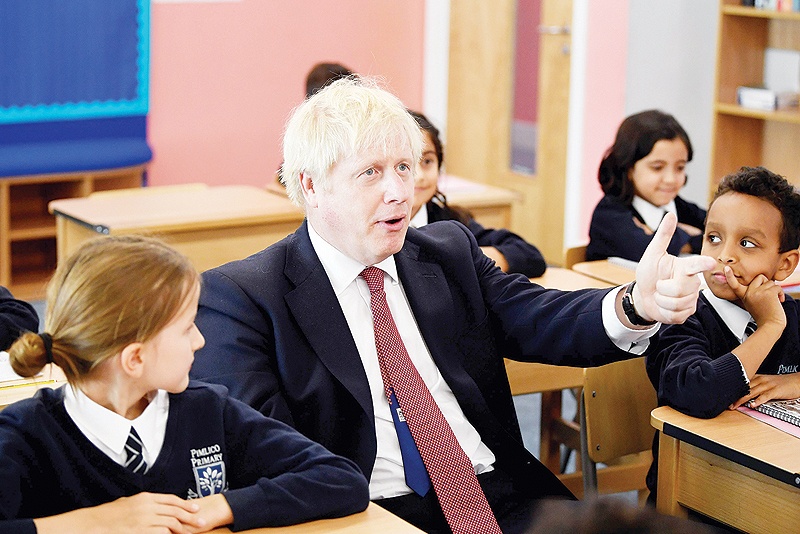Johnson slams opposition for voting against a call for snap election
LONDON: Beleaguered British Prime Minister Boris Johnson vowed to continue his attempts to strike a new Brexit deal with Brussels, after losing yet another vote yesterday during a chaotic parliamentary session. Johnson slammed the opposition for voting against his call for a snap election in the final minutes of a stormy late-night debate ahead of a controversial suspension of parliament called by the prime minister.
He said he would "strive to get an agreement" at a summit in Brussels next month - the alternative being a "no-deal" departure that critics warn would spark economic chaos. Johnson accused his opponents of shirking their duty by blocking an early election. He held a cabinet meeting later on to plot his next move after a series of defections and expulsions left him far short of a parliamentary majority and unable to garner enough votes from MPs to hold an early election.
He was also due to meet with Arlene Foster, leader of Northern Ireland's Democratic Unionist Party (DUP), amid rumors that he may be softening his negotiating demands over the key issue of the Irish border and associated trade conditions after Brexit. Foster, whose party wants Northern Ireland to remain part of Britain, warned Johnson that the province must not be sacrificed in talks. "What people are talking about is the break-up of the United Kingdom," she told Sky News. "That is not something that any prime minister in the United Kingdom is going to in any conscience go along with."


'Will not delay Brexit'
There were dramatic scenes in parliament as the current session drew to a close yesterday. Opposition Labor MPs waved signs reading "silenced" and shouted "Shame on you!" at government lawmakers during a ceremony for the suspension of parliament. The move is normally a simple formality but Johnson was accused of acting high-handedly by calling an extended suspension as the Brexit date looms.
House of Commons speaker John Bercow earlier in the debate announced he would be stepping down in a strongly-worded speech in which he warned the government against trying to "degrade" parliament. Johnson also lost a separate vote, calling on the government to publish confidential papers about the potential impact of a no-deal Brexit.
The opposition has said it will not allow an early election, which under British law requires a two-thirds majority in parliament in favor, until Johnson has either struck a deal or delayed Brexit beyond October 31. But the prime minister insisted he would not delay, despite a bill being rushed through parliament in the past few days that could force him to do so if he fails to reach an agreement with the EU. "This government will not delay Brexit any further," he insisted.
'Significant gaps' remain
Britons voted in 2016 to leave the EU, but after three years of political wrangling, parliament still cannot decide how to implement that decision. Johnson took office in July promising to deliver on the 2016 referendum vote for Brexit, even if that means leaving without exit terms agreed with Brussels.
But many MPs have rejected a no deal divorce and supported new legislation forcing Johnson to request a three-month delay if he fails to strike a deal. His last chance to reach an agreement is at the two-day EU summit starting on October 17. Some commentators have said Johnson may be forced to resign if he does not want to make the delay request. Ministers have also hinted at a potential legal challenge against the law.
MPs have already rejected a draft deal agreed by Johnson's predecessor Theresa May three times, in large part because of its provisions to keep open the border between British Northern Ireland and EU member Ireland. Johnson wants to scrap the so-called "backstop" plan, which would keep Britain aligned to EU trade rules long after Brexit, to avoid any checks at the frontier. But the EU accuses him of offering no alternative. At a meeting with Irish Prime Minister Leo Varadkar on Monday, the two sides agreed that "significant gaps" remain.- AFP

